Dialogue with Feng Jing: Female "Intruders" in the Cold and Natural Territory - Girls born in the 1980s are hard to reach Antarctica | Around the Furnace · CUHK
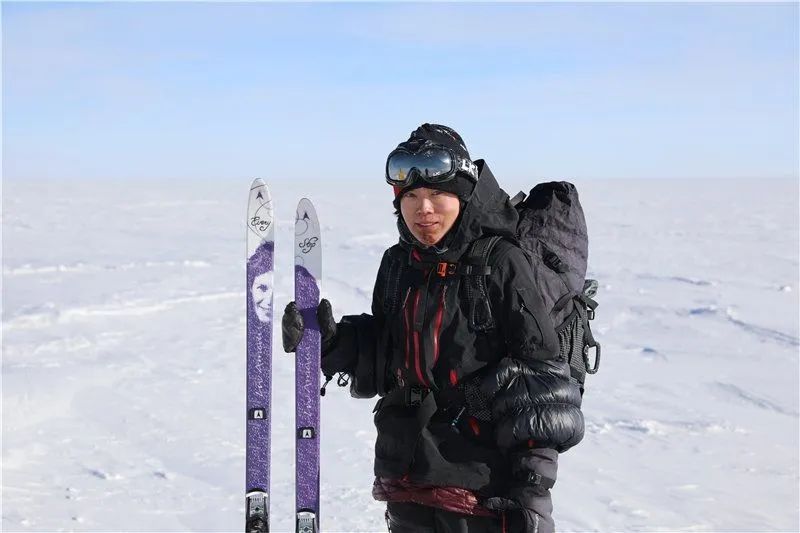

Feng Jing, born in August 1982, graduated from the School of International Relations of Peking University majoring in international politics. Globetrotter, polar explorer. In 2022, he will be a member of the ski team of the Beijing Winter Olympics Organizing Committee, responsible for training to adapt to the extremely cold environment. Since 2010, Feng Jing has traveled to more than 140 countries and regions by foot, self-driving, sailing, etc.
On January 8, 2018, Feng Jing cross-country skied 1,130 kilometers, which lasted 52 days and 5 hours, and reached the South Pole, becoming the first Chinese woman to set off from the coastline and expedition to the South Pole on foot. This hike to the South Pole of the Antarctic Continent was an adaptive training she did for the expedition to the hardest point.
On November 7, 2019, a three-person expedition team of "Going is Coming" initiated by Feng Jing set off from the coast of Princess Astrid, Antarctica. It lasted 80 days and traveled more than 1,800 kilometers. At 7:18 p.m. on January 25, 2018, I reached the Antarctic Continent on foot, with coordinates S82°6.655 E55°1.957, and an altitude of 3715 meters. This is the first time that humans have reached this place with their feet. Before this, only 8 male explorers in the world had reached by kite-skiing.
Feng Jing wrote her own experience into the book "Unconquerable - Chinese Girls Hike the Antarctic Extremely Unreachable", telling the story of how she started from scratch, after five years of tempering, breaking through her own limits again and again, and finally creating a record.
Furnace = Zhou Xuanyu
Feng = Feng Jing
1|About this trip
Furnace | You are the first human to reach the extremes on foot. How does the industry define hiking?
Feng | Hiking in the Antarctic continent means that the hikers bring their own supplies and travel on the Antarctic continent by cross-country skiing. Then, different from this method, there are dog sleds, and a more common type of kite skiing in recent years, mainly with the help of natural wind. It's the same as sailing, it's about cutting corners and advancing in zigzags. A total of eight men had been to Difficult Point before, and they all arrived by kite skiing.
Kite skiing is not much easier than hiking. If you look at it purely from the perspective of physical exertion, it must be that the physical exertion of hiking is greater, but kiting is a technical activity, and it is not easy to master. From my point of view, I will not directly compare the two methods of expedition, because the kite expedition also has its difficulties, for example, if you do not control well, it is very likely to cause fractures. For example, Bear Grylls once wanted to shoot a show in the Antarctic, because he did not follow professional advice, insisted on kite travel in a weather with wind beyond his ability to operate, resulting in a dislocated shoulder, and then he used Rescue services were evacuated and the entire filming was canceled.
Of course, the speed of kite skiing will be much faster, because after all, you have to rely on natural wind power, and its average daily progress can be around 80 kilometers, which is a relatively common mileage. If it is a world record, the straight-line distance traveled in 24 hours is 596 kilometers, and the actual distance traveled will be longer than this. This speed is amazing.
Furnace | Unreachable pole is an unfamiliar word to the public, and many people will confuse the South Pole with the unreachable pole. Can you briefly describe the difference between the Pole of Difficulty and the South Pole? Is conquering the Pole of Difficulty more difficult than conquering the South Pole?
Feng | The South Pole is the southernmost point of the earth, with an altitude of 2835 meters, at this point all directions are north, and it has lost the concept of east and west. The United States built its first permanent structure there in 1956, which was later expanded to become the Amerson Scott Station.
Up to now, the station has been manned, and researchers are engaged in research, so the station has been continuously renovated and expanded. In the summer of the Antarctic continent—November, December, January and early February of the following year, there will be relatively frequent small flights within the Antarctic continent, mainly transporting personnel and materials. Due to better logistical support and security, and more environmental surveys around, hiking with the South Pole as the goal has become a commercial route. The research station has gradually formed a settlement of a certain scale, close to a small village.
The Pole of Inaccessibility (POI) is the point farthest from all the coastlines of the Antarctic continent. In order to check and balance the situation of building a station at the American South Pole, the former Soviet expedition team reached the extreme point before the end of the International Geophysical Year on December 14, 1958, and built a prefabricated wooden house for four people. The Unreachable Pole is 3,715 meters above sea level, almost 900 meters above the South Pole. And because it is the furthest from all coastlines, this place is very difficult to transport supplies compared to the South Pole.
The United States also wanted to fly through the air before the former Soviet Union calibrated this point, in order to reduce the sense of honor that the Soviets had to demarcate from the land. But their flight plan was unsuccessful because of the weather. From 1958, when the station was demarcated, until it was completely abandoned in 1967, there were only a few short-term visits.
The Soviets evacuated all of them after only a few days. After they went back, the Americans came once, and they turned the bust of Lenin on the station from facing Moscow to facing Washington, after which the Soviets went back and corrected the orientation of the bust of Lenin, and then went from During the 40 years from 1967 to 2007, no one visited the POI station, so no one knew the status of the station at that time.
Later, in 2007, the first kite skiing expedition, 4 men, rediscovered POI by kite skiing. At that time, POI was buried by snow. The overall height of its original building was about 5 meters, but it was buried by snow to about 1.7 meters left. Then when I got there in 2020, he was buried a little more deeply, and the height above the surface was about 1.5 meters, so if there is no intervention, this POI station should be in a few decades. was completely buried.
POI has no flights, no regular visits, and very little data on the surrounding environment. At the time of the evacuation, we built a temporary airport runway. The main requirement was to remove hard snow blocks that were raised more than ten centimeters in a certain area, because it would affect the landing of the aircraft.
So to sum up, regardless of history, geographical location, altitude or natural environment, POI is far more difficult to reach than the South Pole.
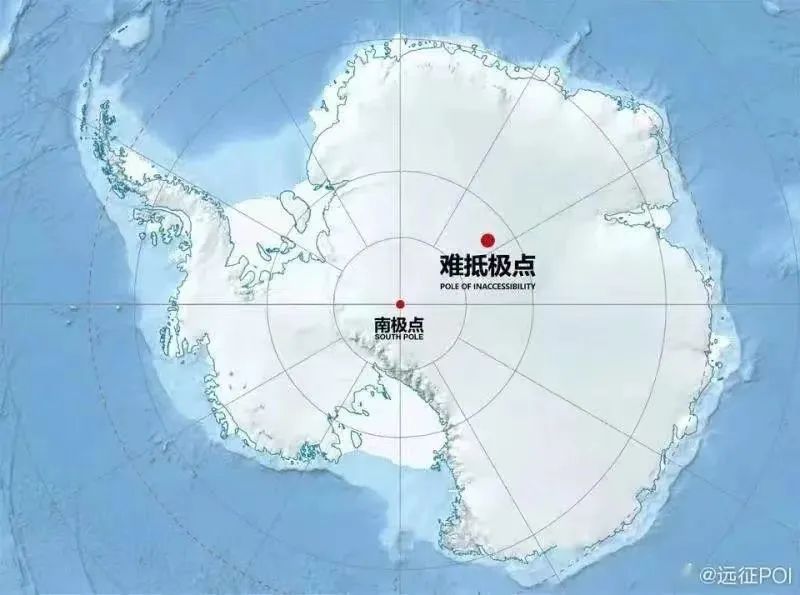
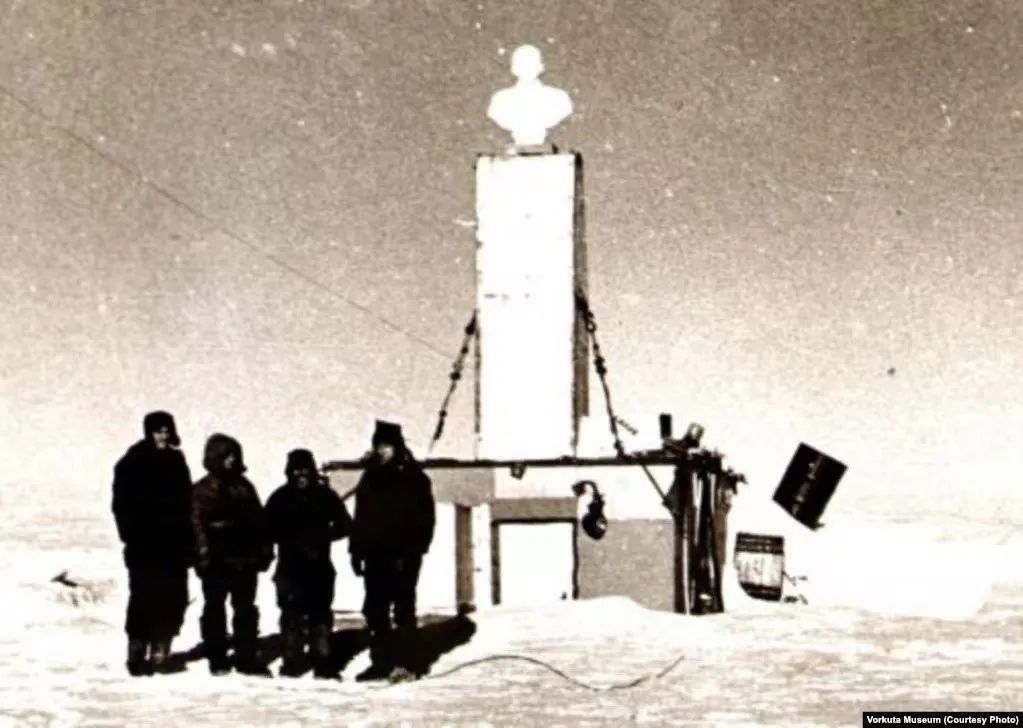
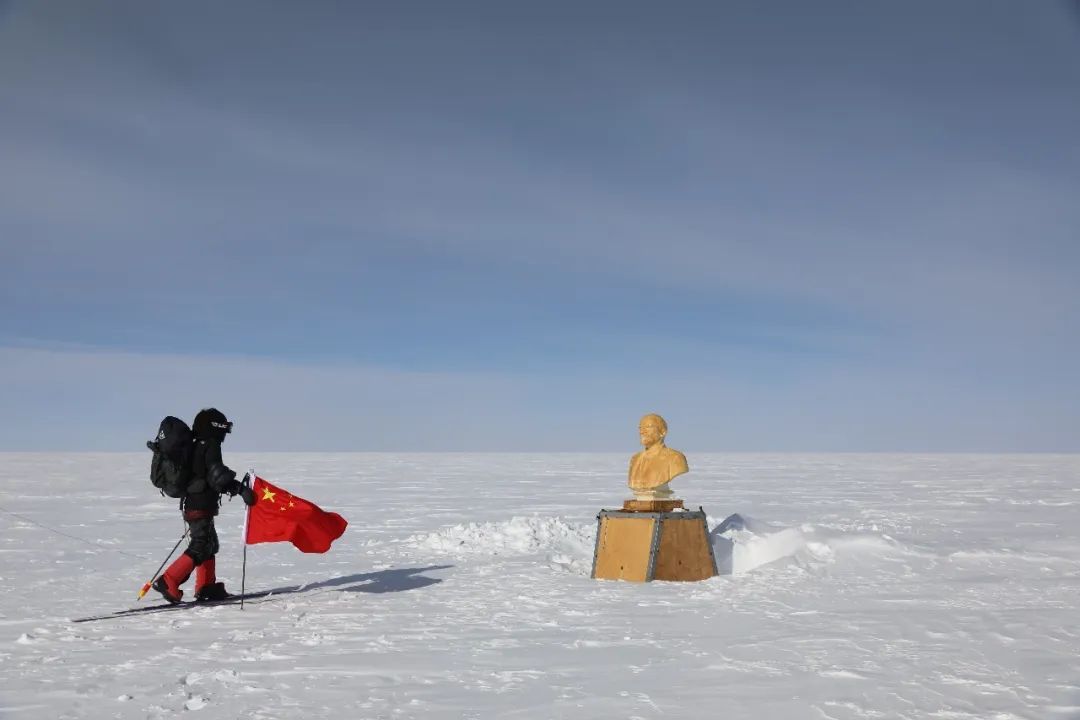
Furnace | Your trek is extremely difficult, it is more repetitive and monotonous, accompanied by many physical tests and tortures, and the employees who travel with you also have the idea that the journey is difficult and uninteresting. Do you think the journey is very boring? Did you experience anything different on the way?
Feng | I have never been bored. Of course this is just for me.
This is not a project that I suddenly want to do on a whim. I have been preparing for it for 5 years. And in order to go to POI, I first hiked the South Pole, collected enough first-hand experience, and then continued to make more detailed preparations on this basis, before starting such an expedition project.
So for me it's never been a question of whether it's boring or not, it's a long-term goal, and when you have a goal, you have to put in a lot of effort and a lot of cost, so I talked to his The stance is completely different, he is just my employee, accepts my salary, and then works for me, so it is not his dream for him, but for me, trekking POI is my dream.
The more interesting thing about this itinerary is that it is very accidental that you will meet other people. For example, when I was hiking POI, I met the Russians. They were making a fuel refueling station for the White Desert company. We didn't know each other's existence until we met them in the depths of the snowfield, so it was a wonderful experience, and I explained the specific things in the book.
Furnace | So what do you do on the way to get rid of the monotony of being on the go? Like do you listen to music or do something else?
Feng | No, first of all the wind noise is very loud unless the volume is turned up very loudly, which is not good for health. Plus you don't have the extra energy to do more things, because all your physical and mental will is completely consumed on the hike, so you're unlikely to have any leisure to do other things for fun . Because the expedition is not a tour of the mountains and waters, talking and laughing, it is just a journey to a certain place with a little hard work.
I am 1.64 meters tall. At the end of the expedition, I was about 80 pounds, which was 20 pounds less than before the expedition. At that time, the food was sufficient during my trip. Of course, it may not be so pleasant in taste, but it is completely guaranteed in terms of calories. My food intake was about 4 to 5 times what I normally would. But even so, the body cannot store any calories, and that consumption is beyond any experience of daily life.
It takes about 10 hours to hike during the day, about an hour to set up camp, and a total of about an hour to rest in the middle, so basically the time of exposure to the extreme cold has reached 12 to 13 hours. In addition, you need to eat, sleep, and take care of all your equipment. Don't worry about the equipment after camping. It takes time to dig out the ice from the shoes and turn everything back to dry as much as possible. Then in the middle of the night, if the weather is not so ideal, you also need to deal with wet clothes. These all take time, so 8 to 9 hours of sleep a day is barely enough to cover the next day's schedule.
So it is absolutely impossible to generate extra energy to think about any entertainment projects, which is unrealistic.
Furnace | You mentioned that you encountered many difficulties during the expedition, not only the difficulties of the expedition itself, but also the unpredictable people. After traveling for a long time, you need to take painkillers, altitude sickness, the air cushion of the tent leaks due to air pressure, and the employees secretly transfer the load. , exploiting contract loopholes to embezzle your items, etc. Also, what difficulties have you encountered? Among the many difficulties, what do you think is the most difficult to overcome?
Feng | First of all, the difficulty I didn't expect was the dislocated right thumb, which brought a whole series of troubles. Because of the inconvenience caused by the dislocation, I can only rely on the left hand to support the snow pole, because pressing it with a lot of force than normal will soon break the left hand pole. Due to the inconvenience of my fingers, I accidentally slashed my face once I shoveled snow, which caused a serious infection of my entire chin. The infection worsened greatly in the later stage, and it also affected the time I stayed after arriving at POI. I originally planned to stay at POI for about a week, but because of the severe infection, I only stayed for two days.
In addition, I understand that employees and I have different positions when it comes to people's hearts. It's my dream, but it's a job for them. So it is impossible for them to put as much effort and determination as I did for this matter. In those extremely difficult, very hard, and very exhausting situations, one exposes the evil of human nature. It's not helpful to reason in that kind of place. Too much calculation is not beneficial to the completion of the expedition.
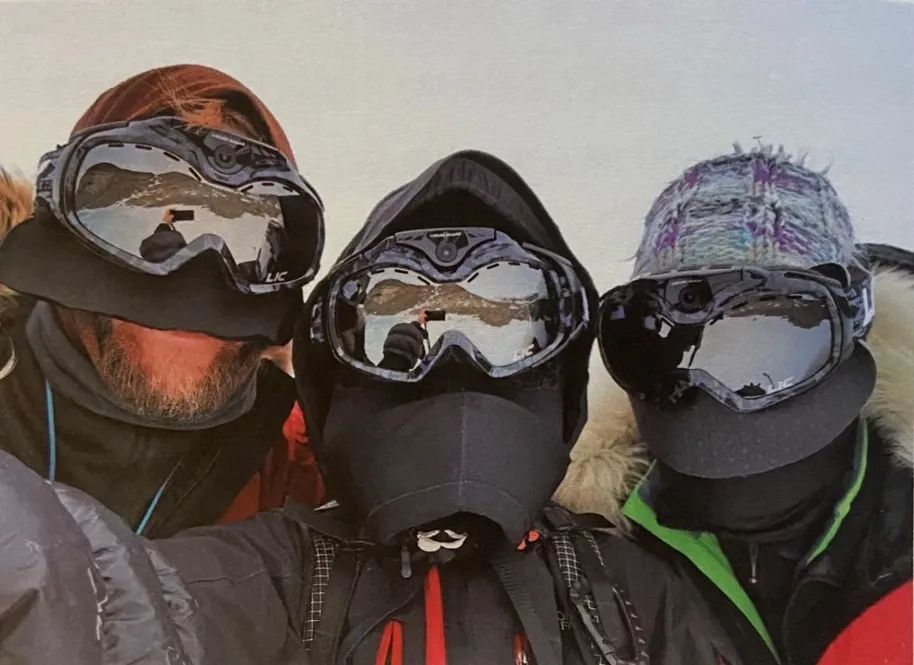
Furnace | Did you get commercial sponsorship during your expedition? Can you briefly introduce the business model of the expedition?
Feng | In fact, anything that can be applied to the current business model, such as live broadcasting, is not an adventure in our opinion, because as long as you have extra energy for live broadcasting, it means that its difficulty and risk are relatively low, and it is more It’s a gimmick, and it’s more about selling a sense of curiosity and novelty.
For my project, when I first wanted to seek some sponsorship, many people asked me to broadcast, and I said it was impossible. First of all, I was exhausted myself, a lot of energy was spent on the road, and there was no extra energy to collect material.
Furthermore, even if I reluctantly collected a part of the material, I had no way to pass it on. Now if I use Musk's "Starlink Project", it may be slightly better than my transmission situation at the time. Because I was using a narrowband satellite and had limited data transmission capacity, even a satellite phone call was often dropped at that time, let alone photos or videos.
More than 100 years ago, their traditional model was to go to VCs first, and promise these sponsors and VCs with the naming rights of unknown places. For example, if an explorer discovered a mountain or a bay that no one has ever visited, they would use the sponsor or the name of the VC. their family name. This is no longer possible today. In addition, the European royal family and family at that time had a culture of "honorary sponsorship". The so-called "honorary sponsorship" is that those who are particularly prestigious are guaranteed by their reputation, and then explorers use such "honorary sponsorship" to seek money in society. and material help.
From personal experience, many people do not understand what this is at all. After explaining it clearly, they generally think that the risk is too high and the return is too low, so they are unwilling to invest in sponsorship. Unless there is a dedicated public relations team to handle this matter for you, for individuals, spending time convincing others to provide you with some sponsorship will greatly affect the progress of the entire project.
At least it was difficult for me to get sponsorship at the time, maybe when I do the next project, based on my previous record, I can seek some sponsorship
2|Growth and Choice
Furnace | You mentioned in your book and interviews that you started your globetrotting under the influence of traveler Yusuke Ishida and anthropologist Yoshiharu Sekino. Besides, were you influenced by your friends, family members, majors in college or other experiences when you were growing up, which pushed you to make the choice to leave your white-collar job and travel around the world?
Feng | No, there is no one like me around me. I did not work in international relations after graduation. It was a spontaneous act, not because of being influenced by someone very close, nor being preached by anyone.
From traveling around the world to hiking the Antarctic expedition, this is a very long process. At the beginning, I just had a very superficial idea of traveling around the world. I didn’t know where I could go, how far, and how long I could go on the first day. I was really eager to do this at the time, but as to whether I could do it, or to what extent I could do it, I definitely had no idea when I set out. Things have to be done so that you can keep up with his rhythm, and you can have expectations for the next step in the future.
At first I was just talking to friends and I thought two years of globetrotting would be enough. But when I set foot on this road, I realized that two years is not enough. During this process, I was constantly adjusting my plan, and I didn’t expect to be on the road for the next 10 years from the beginning.
So maybe it was because of this lack of clarity that I could make up my mind when I was relatively young and I would go for a walk and have a look, but it might only take two or three years. And at the time, I didn't know if I was curious enough about the world to be on the road all the time. It may happen that the more you travel, the more you want to see; it is also possible that you give up halfway because of frustration.
In addition, I did not grow up in the era of the rise of the Internet. The information of our generation is very limited, so it is not applicable to plan the life of the next few decades with our very narrow vision at that time.
If I go back to my past life experiences, I can find some connections to the choices I make now, even if I didn't realize them at the time. For example, when I was young, I read a lot. Such a reading habit allowed me to dabble in a wider range of knowledge and think about more possibilities and options. At that time, I also liked to read some outdoor adventure books. So I know that the expedition is not something I have grown up with. I should have seen some earlier stories of polar expeditions when I was in my teens, so the expedition is not a foreign concept to me, and I am not It wasn't that one day I suddenly heard about expeditions for the first time, thought it was novel, and decided I was going to do it.
Furnace | You read a lot of explorer books, what did you get from them? Like, for example, specific expedition experience, or their determination and perseverance? What do you think you have in common with them, or what advantages do you have over them?
Feng | I found that a big feature is that these people who have been engaged in exploration for a long time, in fact, they do not meet our usual expectations in terms of body shape and appearance. They are all relatively thin people.
What I've seen in them, all I can understand is that determination can help you do a lot of things, and when you really want to do it, your body isn't going to be a particularly big hindrance, of course It does have some disadvantages compared to those who are stronger and more physically dominant, but it won't be the deciding factor.
3|Antarctic and women
Furnace | You mentioned that "Antarctica, a land without aboriginal affection, has built patriarchy like most cultures in the world for more than a century since then, and women are excluded. Until 1935, the Norwegian whaling ship The captain's wife, Caroline Mickelson, set foot on the Trine Islands near the Antarctic continent, and women gradually appeared in different fields of Antarctic affairs." What is the situation of women in polar circle expeditions now? What do insiders say about the performance of female explorers?
Feng | Objectively speaking, more than 100 years from its birth to today, this is still a field dominated by men. The ratio of women to men in Antarctica is not even 1:10. As far as women in this circle are concerned, they think that they appear occasionally, and women have no right to speak in this circle. There are very few female guides, in single digits.
But I can also see that women have become more and more active in recent years. First of all, this must be due to the improvement of the status of women in various countries, and there are more opportunities to participate in such activities.
The polar expedition itself has huge requirements on physical fitness. There are natural differences between men and women. There is no need to deny this difference, that is, women are indeed inferior to men in terms of physical fitness. More than 100 years ago, in the days of the Scott, Amundsen, and Shackleton expeditions, they all received applications from women who wanted to participate in their expeditions, but in their opinion it was not feasible, they thought the work itself It's a physical activity.
But the expedition is not only a test of physical fitness, it also tests your toughness, to what extent you can endure that kind of hardship, pain and suffering; it also tests your wisdom and your strategy. At this point, I guess there is no gender distinction.
Some women on expeditions use men's skis, because these women are tall and heavy enough to use men's skis, even the smallest size. But my height and weight make it impossible for me to use the smallest men's skis, which are too big, too long for me, and I can't hold back. So I still can only use the smallest size in women's gear. And then there are tons of supplies that I couldn't buy and had to make myself.
Therefore, in these outdoor projects, although we women cannot break the records that are more focused on competition, we can still do some things that we can possibly do. Before this project like I did, at least no one was walking, they were kite-skiing, car or plane.
Furnace | Before you set off, did you say that you wanted to change the gap between men and women in Antarctica or the prejudice against women?
Feng | I didn't do it intentionally. I never said that I wanted to teach the prejudices a lesson as a challenger. I never thought so. My goal was to do this in the first place, and the other effects and side effects were simply not considered at the time.
Furnace | As the first human being to walk to the extreme, the first woman, what do you think your achievements mean to women?
Feng | I think it should be the incentive value. First of all, I think you can set a goal that is beyond your vision or even your ability at the time. As long as you are willing to pay for this goal and work hard, no matter whether you can really achieve it in the end, but in the process of getting closer , there will be huge growth.
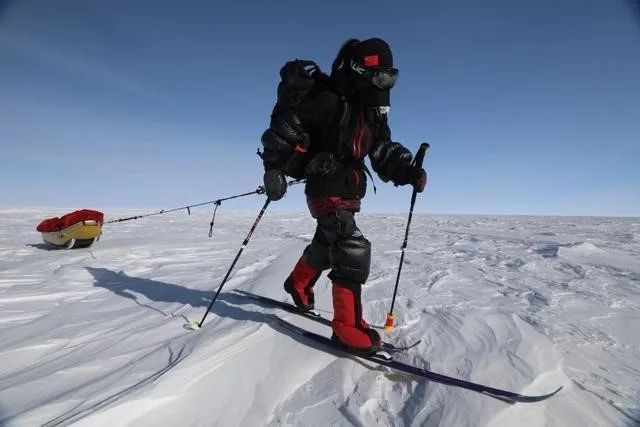
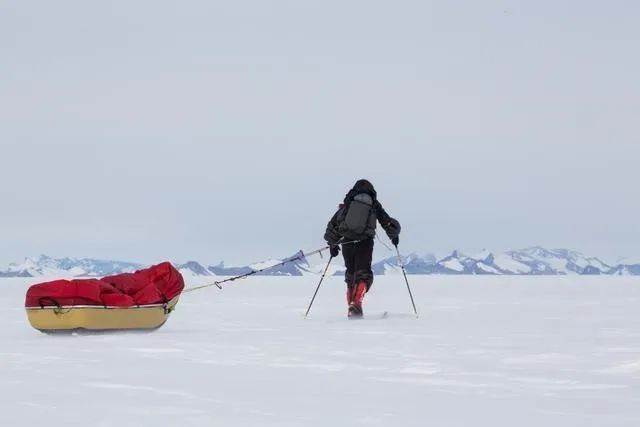
4|The significance of the Antarctic expedition
Furnace | Difficulty is a place of wabi-sabi, a word unfamiliar to the public. Many people can't even tell the difference between the Infinity Pole and the South Pole, and think that your expedition is nothing special; some people think that the expedition is a commercial activity: entrusting companies to operate related businesses and hiring guides are just a difficult process. long trips; what do you think of these biases? What other biases have you encountered?
Feng | Too much prejudice. This is simply indescribable. I can say that this is a white male culture, mainly the domain of European and American monopoly. So when you go in as an Asian or a woman in this field, you just look weird, and even the fact that I'm in Haugasto to train seems weird to them. Locals say that there are basically very few Asians in their place.
When I set off, I was in a state of illness and my health was very poor. In addition, my height itself was relatively short. I was only 1.64 meters, so the people at the base did not think my project was feasible. , they said "the plane will be ready to pick you up", in fact, ready to come to the rescue. Because every few years there will always be some nonsense expeditions in Antarctica, the goals are very ambitious, and they end up halfway. This is not a very rare situation.
As for the views on business conduct, how do you define business conduct? Is it a commercial act with any commercial support? Using GPS, making satellite phone calls, and accepting coverage from insurance companies can all be considered commercial activities. Compared with the South Pole, Difficulty Extreme is not a commercial route at all. No one runs this project, no one sells this project to me, and no one even advocates for me to do it.
These so-called prejudices have always existed, but unless they attack directly, they should not be ignored, because there is still a lot of business to do, so much training to be completed, so much equipment to test, and time spent with prejudice The more time you spend arguing, the less time you have to do the right thing, and the result actually supports some prejudice.
Spend your energy on what you need to do and what you should do. As for those prejudices, my experience is to ignore them.
Furnace | You also mentioned that polar exploration is a niche culture, and the values conveyed have been gradually sublimated into the common spiritual wealth of mankind after more than a century of precipitation. How do you interpret the spiritual wealth here?
Fung | I think it's Shackleton's phrase "Perseverance wins."
Just like we can drive a car, we can ride a bike, and there are ways to be much faster than with two legs, why do we need to run long distance races to keep setting records? Nowadays, we can basically travel unimpeded on the Antarctic continent with planes and heavy-duty modified vehicles, but why do we still use the way of expedition?
That's because the act itself is valuable, and it also contains the spirit of human beings to constantly break through the limits of self-breakthrough. This is why polar exploration has been passed down from more than 100 years ago to the present.
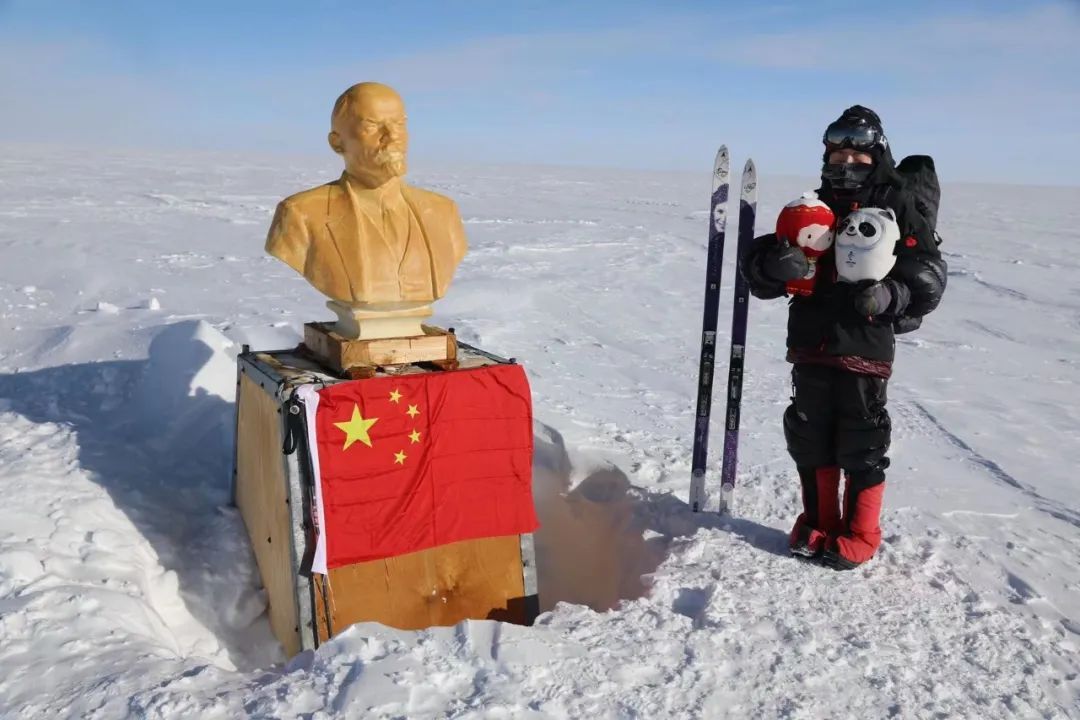
5|Antarctic development and disputes
Furnace | You take environmental protection seriously: despite the heavy load on your expedition, you still take care of your plastic waste. What impact do you think Antarctic travel, expeditions and Antarctic development have on the environment and animals? How about the current environmental protection and animal protection measures?
Feng | At present, the relatively large-scale tourism in Antarctica, such as the cruise ship industry, generally has strict environmental protection measures. The rubbish of guests on cruise ships is strictly controlled, and their waste is also brought back to the ship and will not be dumped in the Antarctic. Of course, this still has a certain impact on the local natural environment, so the relevant personnel are trying to minimize the impact as much as possible.
A trip like ours has very little impact on Antarctica because we only make some excrement. As the ice sheet moves under the force of gravity, the waste is slowly pushed around from the middle of the interior and eventually into the ocean. But it's just our excrement, we don't leave any other rubbish, so there won't be that kind of non-degradable rubbish left. Including like my ski poles, when the skis shattered, I brought back every piece of plastic and debris.
Furnace | Your major in university is international relations, and you also have an exploration of international issues in Antarctica in your book. The Antarctic Treaty of December 1, 1959 put the issue of Antarctic sovereignty on hold for the time being. But Antarctica, as a continent with great potential for development, still attracts the attention of all countries. Can you briefly talk about the disputes in Antarctica?
Feng | The Antarctic is different from the North Pole in that it exists on land, while the North Pole is more of sea ice. Therefore, there is indeed a so-called sovereignty dispute in Antarctica, and its essence is actually a competition for resources. The Antarctic reserves a lot of resources, but in the natural environment of the Antarctic, with the current technical conditions, the development and utilization of these resources is still relatively expensive, so it has not yet entered the commercial stage.
Antarctic sovereignty disputes have always existed. The Antarctic Convention only shelved disputes, but how long it can protect and how long disputes can be shelved depends on the balance of power of various countries in this place. Everyone is guarding against a dominant one, to avoid who can have the absolute right to speak in Antarctica, but they are also carefully expanding their influence.
So now countries are constantly staking their horses in Antarctica. In fact, at that time, on December 31, 1958, before the closing of the third International Geophysical Year, countries wanted to leave more evidence to divide up the Antarctic in the future. , so a large number of expedition teams entered the Antarctic, which was caused by a historical environment at that time.
And if you go to the Antarctic research station now, you can see that the boundaries of a considerable number of research stations are very clear. Although there is no territory and no sovereignty that can be recognized on the surface, in fact, the research stations are the territory of each country. Once a country sets up a research station in a certain place, other countries cannot set up research stations within a certain range. This situation has continued until now, so the future of Antarctica is actually not very clear. The protection of the Antarctic Convention also has quite limited.
6|Write on the back
Furnace | Is there anything you would like to say to the college community?
Feng | All I can feel is that first you have to have a goal and then define what you need to do to achieve that goal.
After I entered junior high school, when my grades were able to stably enter the forefront, I would have a very clear idea that I would be admitted to a first-class university. But if compared with the college entrance examination, it seems very unfeasible for me to do an expedition later, because the college entrance examination is still based on an evaluation of your long-term academic performance, and you can predict yourself. What level of school can I get into?
But at the time when I decided to do this project it seemed completely unfeasible, because I didn't even start, I didn't know anything, I hadn't skied, even the most basic alpine skiing and cross-country skiing were not clear. , I was 33 at the time.
At each stage of life, you have to set a different goal, and you have to have the ability to predict and bear the consequences. You can keep trying when you are young, but when you reach a certain age, time does not allow you to be random. Make futile attempts.
There is a saying called done is better than perfect, first of all you have to figure out how to make this thing, and then you want to make it look good. I want to complete the expedition first. If I want to complete the long-distance thing, the most basic thing to do is to learn to ski. I have to learn how to survive in the conditions of minus 30 degrees and minus 50 degrees. During the expedition You have to take care of your own clothing, food, housing, and transportation. You don't have a house to live in, you live in two pieces of cloth every day, and you have to deal with injuries yourself. Because there is no medical support, these difficulties are what you can expect before you set off. All professional Suggestions say that expedition POI cannot be done.
The way I do it is to take professional advice in part, and when they say it can't be done, I ignore it. I insist on training first. When the training reaches a certain level, the advice I get is that if you insist on doing POI, you should at least go to the South Pole first, and you will accumulate some experience first, and then evaluate the feasibility of the next step. Sex, that was the advice I got at the time, but I felt it was rationalizing advice, so I decided to take it.
So in order to go to the extreme, I went to the South Pole first, and encountered a lot of difficulties in the middle. After all, it is a very long-term trip, and it is not something that you can endure there for 3 days and 5 days, so At this time, evaluate whether you can endure more pain and then achieve the goal you really want to achieve. At that time, I could actually deceive myself and say that going to the South Pole was already very good, and forget about such a tiring thing.
But I feel that my things are not finished, and I still have to stick to the goal of reaching the extreme. It was under my series of persistence that I avoided the impact of the new crown epidemic. If I had hesitated a little at the time, this matter might have been delayed for a long time, and now it is obviously impossible to make it happen.
I think that studying at a young age is indeed a summary of a stage in life. Most of us are receiving regular and systematic education before our teenage years. It is a summary of this period of your life. Do you want to In this life summary, you must achieve a result that satisfies you as much as possible. Of course, it is the best if you achieve it. What if you don’t? There is still a next stage in life. Life is not very short, and it stays on a certain assessment. If it doesn't work this time, I think the most important thing is that during this period of time, have you really put in all the effort you can?
For me, the expedition failed under the premise that I put in all my efforts and did everything I could. Although I cannot say that I am very happy with this result, I'm okay with that because I feel like I've learned a lot in it, and while I do have a desire to succeed, there's no need to hide that. But if it doesn't work, I think as long as I do everything I can, I've put in all the hard work I can, and if it doesn't work, it's a worthwhile experience.
I think every stage of life is like this. If you set a goal, you have to go all out. If you still can’t achieve it after trying your best, I don’t think it’s so regrettable. It will definitely be very beneficial to your whole life. an experience. It is impossible for everything in life to be satisfactory, and there is no rule that no effort must be made and no harvest must be obtained.
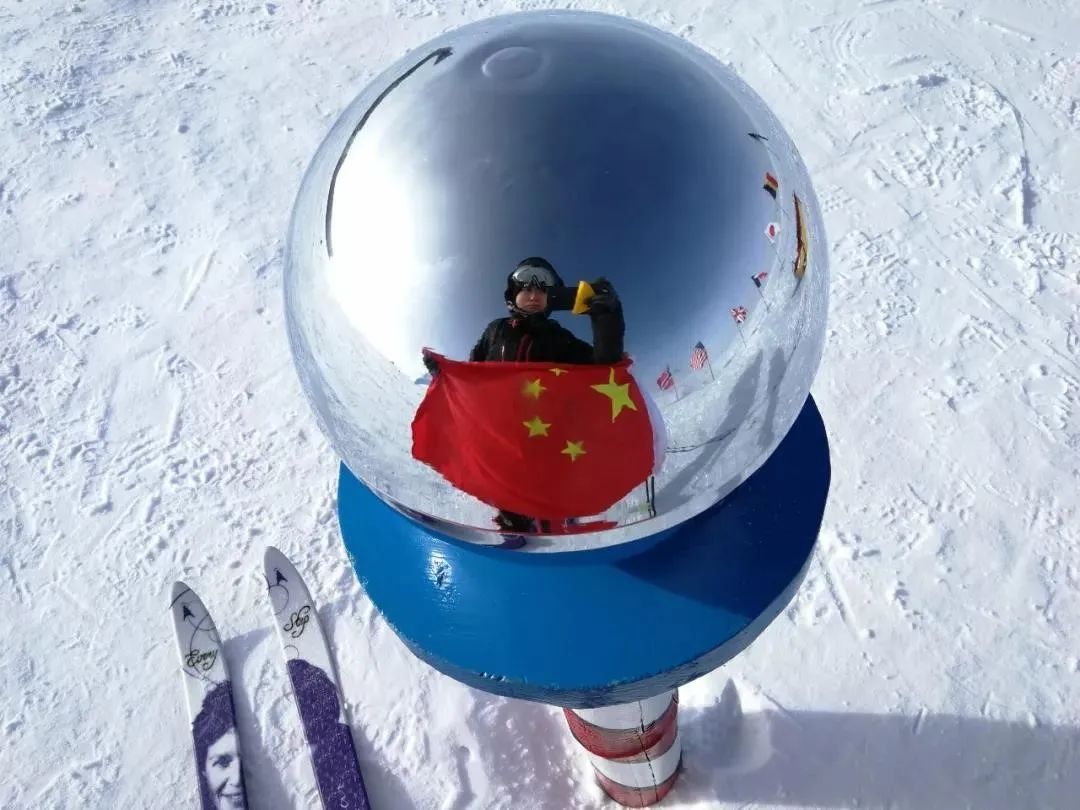
Furnace | Do you have any plans for your next trip? Would you mind revealing it?
Feng | I have projects that I am interested in, but as far as the current environment is concerned, there is no room for operation, so for the time being, it has not entered the operation stage, and there is no specific project being implemented.
From my personal experience, I don't think I will do a project more difficult than POI in my lifetime, because I have reached my limit physically and mentally, and the pressure in all aspects is extremely high, which is the most stressful time in my life. year.

Written | Zhou Xuanyu
Figure | Sourced from the Internet
Review | Nicole
Editor | Yao Yinan
matters editor|Xing Yixuan
Around the Fire (ID: weilu_flame)

Like my work? Don't forget to support and clap, let me know that you are with me on the road of creation. Keep this enthusiasm together!

- Author
- More